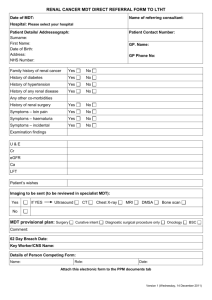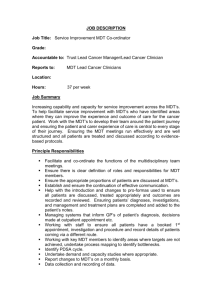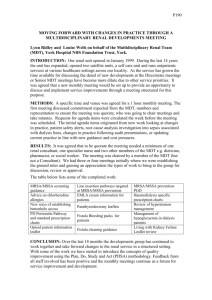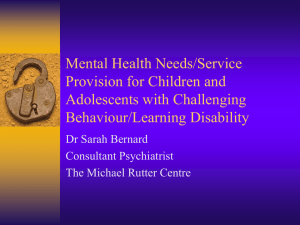The Multidisciplinary Team, Testing Considerations, and Parental
advertisement
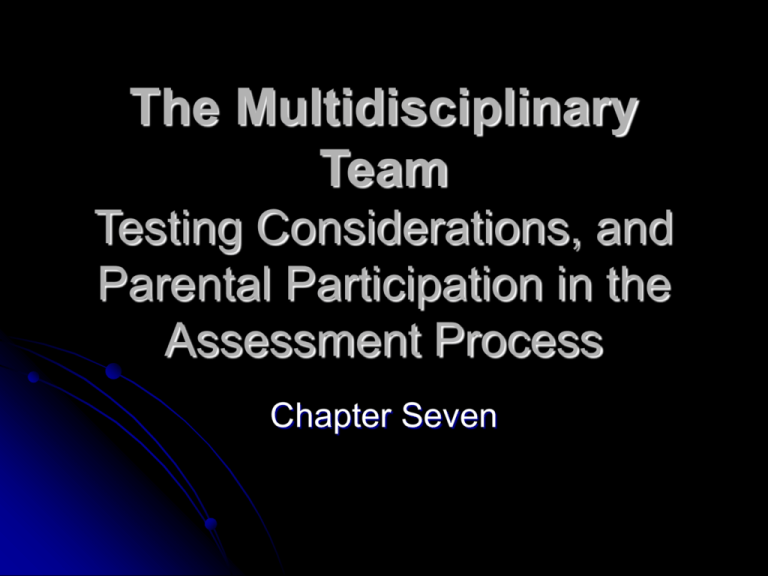
The Multidisciplinary Team Testing Considerations, and Parental Participation in the Assessment Process Chapter Seven CHAPTER OBJECTIVES Understand the following Multidisciplinary team (MDT) Purpose of the MDT Membership of the MDT Formal referral for a suspected disability Contents of a referral to the MDT Initial referral to the MDT from the school staff Initial referral to the MDT from a parent/guardian Assessment plans-consent for evaluation Assessment options of the MDT Selecting an appropriate instrument Limitations of testing Parental participation in the assessment process How to conduct parent intakes and interviews Parent intakes Confidentiality The Multidisciplinary Team MDT Multifactor Team (MFT) School-Based Support Team (SBST) Usually comes into operation when the local school-based team (Child Study Team) has conducted a screening and suspects a disability Purpose of the MDT The role is to work as a single unit in determining the possible cause, contributing behavioral factors, educational status, prognosis(outcome), and recommendations for a student with a suspected disability. Membership of the MDT School psychologist School nurse Classroom teacher School social worker Special education teacher Educational diagnostician Physical therapist Behavioral consultant Speech/language clinician Audiologist Occupational therapist Guidance counselor Parents FORMAL REFERRAL A form starting the special education process A referral for evaluation and possible special education services is initiated by a written request Contents of a Referral Signed and dated paperwork Further documentation as to why a possible disability exists Descriptions of attempts to remediate the child’s behaviors (prereferral strategies) Performance prior to the referral If not from the parents, the district must inform the parents in writing immediately IMPORTANT POINT If a release for testing (assessment plan) is not secured at a separate meeting, the chairperson of the MDT will mail one to the parents along with the letter indicating that a referral has been made. No formal evaluations may begin until the district has received signed permission from the parent or guardian. Assessment Plans Consent for Evaluation In a language easily understood by the general public In the primary language of the parent Explains the types of assessments to be conducted States that no IEP will result from the assessment without the consent of a parent Assessment Plans Consent for Evaluation No assessment shall be conducted unless the written consent of the parent is obtained prior to assessment A copy of the parent rights, including the right to record electronically the proceedings of the eligibility committee meetings Assessment/Psychological assessment/ Health Assessment shall be conducted by persons competent in that area Assessment Options of the Multidisciplinary Team Academic Achievement Evaluation Intellectual and Psychological Evaluation Perceptual Evaluation Oral Language Evaluation Occupational Therapy Evaluation Physical Therapy Evaluation TESTING CONSIDERATIONS Selecting an appropriate instrument: Consider the student’s skill areas to be assessed, and identify a range of tests that measure those skill areas Investigate how suitable each test identified is for the student to be assessed and select those that are most appropriate Some questions to ask when reviewing a test What is the test supposed to measure? Is the test valid and reliable? Is the test appropriate for the student’s age and grade? If norm-referenced, does the norm group resemble the student? What is the purpose of the test? Some questions to ask when reviewing a test Is the test administered by a group or individually? Does the examiner need specialized training? Will the student’s suspected disability impact his or her taking of the test? How similar to actual classroom tasks are the tasks on the test? LIMITATIONS OF TESTING Usefulness of traditional testing in making good educational decisions for children is questioned Lack of usefulness in designing interventions Scores may not reflect what the child really knows of what is taught in the classroom Overfamiliarity with repeated tests Inability to apply test findings in practical way Difficulty in using such measures to monitor shortterm achievement gains Parent Participation in the Assessment Process Waterman (1994) lists parental options, responsibilities, and expectations prior to an assessment for a suspected disability on pages 108 and 109 Parent Intakes and Interviews A parent intake is a gathering of pertinent information from a parent. It may involve interviewing the parent to obtain a complete family history. When conducting a parent intake… Help the parent feel comfortable… Hold the meeting in a pleasant setting… Never view parents as adversaries… Inform parents every step of the way… Inform parents of the types, names and purposes of the evaluation instruments… Reassure the parents about confidentiality of information gathered… Goals of a Parent Intake Identifying data and family information Developmental history Academic history Social History CONFIDENTIALITY Information collected through assessment automatically becomes part of a child’s school records Each school district should have confidentiality policies Handouts with the district’s policy are usually given out on the day of the parent intake CHAPTER OBJECTIVES Understand the following Multidisciplinary team (MDT) Purpose of the MDT Membership of the MDT Formal referral for a suspected disability Contents of a referral to the MDT Initial referral to the MDT from the school staff Initial referral to the MDT from a parent/guardian Assessment plans-consent for evaluation Assessment options of the MDT Selecting an appropriate instrument Limitations of testing Parental participation in the assessment process How to conduct parent intakes and interviews Parent intakes Confidentiality THE END


